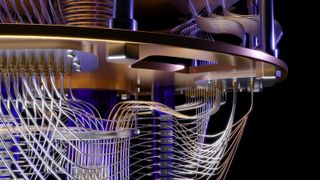Google's Sycamore quantum computer chip can now outperform the fastest supercomputers, new study suggests
Experiments on Google's 67-qubit Sycamore processor showed operations entering a new "weak noise phase" in which calculations were complex enough to outperform supercomputers, based on benchmark testing.

Quantum computers can outpace our fastest classical computers in very specific areas, a groundbreaking experiment suggests.
Google Quantum AI researchers have discovered a "stable computationally complex phase" that can be achieved with existing quantum processing units (QPUs), also known as quantum processors.
This means that when quantum computers enter this specific "weak noise phase," they can perform computationally complex calculations that outpace the performance of the fastest supercomputers. The research — which was led by Alexis Morvan, a quantum computing researcher at Google — was published Oct. 9 in the journal Nature.
"We are focused on developing practical applications for quantum computers that cannot be done on a classical computer," Google Quantum AI representatives told Live Science in an email. "This research is a significant step in that direction. Our next challenge is to demonstrate a 'beyond classical' application with real-world impact."
However, the data produced by quantum computers is still noisy, meaning they still need to do fairly intensive quantum "error correction" as the number of qubits rises in order for the qubits to remain in the "weak noise phase," they added.
Related: History of quantum computing: 12 key moments that shaped the future of computers
Qubits, which are embedded in QPUs, rely on the principles of quantum mechanics to run calculations in parallel, whereas classical computing bits can only process data in sequence. The more qubits are on a QPU, the more exponentially powerful a machine becomes. Due to these parallel processing capabilities, calculations that would take a classical computer thousands of years to perform could be accomplished by a quantum computer in seconds.
Sign up for the Live Science daily newsletter now
Get the world’s most fascinating discoveries delivered straight to your inbox.
But qubits are "noisy," meaning they are highly sensitive and prone to failure due to interference; approximately 1 in 100 qubits fails, versus 1 in 1 billion, billion bits. Examples include environmental disturbances such as temperature changes, magnetic fields or even radiation from space.
This high error rate means that to achieve "quantum supremacy," you would need extremely proficient error-correction technologies — which do not yet exist — or a quantum computer with millions of qubits. Scaling quantum computers isn't easy, with the most qubits in a single machine today standing at approximately 1,000.
But the new experiment run by Google scientists suggests that quantum computers can withstand the current levels of noise and outperform classical computers in specific calculations. However, error correction may still be required when machines scale up.
The scientists used a method known as random circuit sampling (RCS) to test the fidelity of a 2D grid of superconducting qubits, which are one of the most common types of qubits and made from a superconducting metal suspended in temperatures close to absolute zero. RCS is a benchmark that measures the performance of a quantum computer compared with that of a classical supercomputer, and it's the hardest benchmark to perform on a quantum computer, the scientists said.
The experiments revealed that working qubits can transition between a first phase and a second phase, called a "weak noise phase," by triggering certain conditions. In the experiments, the scientists artificially increased the noise or slowed the spread of quantum correlations. In this second, "weak noise phase," the computation was complex enough that they concluded a quantum computer could outperform a classical computer. They demonstrated this on Google's 67-qubit Sycamore chip.
"This is a waypoint on the journey to get to real-world applications, or beyond classical commercial applications," Google Quantum AI representatives said. "Those applications should not be replicable on a classical computer. Our results within this research is a significant step in that direction. If you cannot win on the RCS benchmark, you cannot win on anything else."

Keumars is the technology editor at Live Science. He has written for a variety of publications including ITPro, The Week Digital, ComputerActive, The Independent, The Observer, Metro and TechRadar Pro. He has worked as a technology journalist for more than five years, having previously held the role of features editor with ITPro. He is an NCTJ-qualified journalist and has a degree in biomedical sciences from Queen Mary, University of London. He's also registered as a foundational chartered manager with the Chartered Management Institute (CMI), having qualified as a Level 3 Team leader with distinction in 2023.